Power is not everything, it is the only thing.
Taking responsibility not only for his own life, but the lives of others, the Ruler is one of the most recognizable and easily corruptible Jungian archetypes. This is the archetype of power, plain and simple, but what comes with power is a dangerous tightrope walk between order and chaos.
As I have mentioned in prior posts in this series, this collection of essays deal with the archetypes first put forth by psychiatrist Carl Jung, and the use of these archetypes in fiction. Every post deals with the motivations, character profiles, and Shadows (or negatives) of each archetype. This week we conclude our look at the group known as the Self types, which are defined by goals related to the Ego, or agendas that serve to improve personal spiritual, mental, or physical standings with the world. The Ruler, driven by a need for power, is (fittingly) the final of the twelve archetypes in the series.
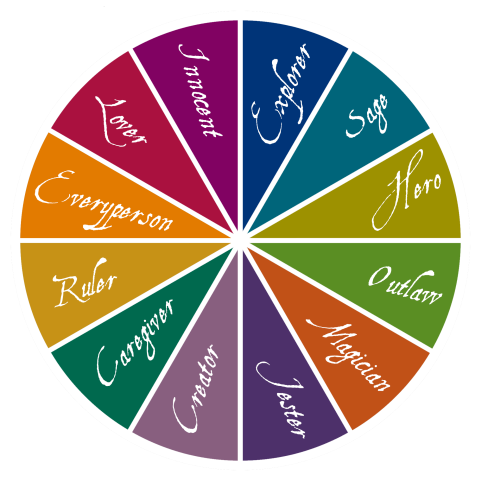
THE TWELVE ARCHETYPES
The Ruler
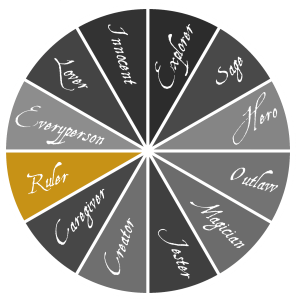
Also known as the king, queen, boss, leader, politician, role model, manager, or aristocrat, the Ruler is always at the top of the food chain, and is generally wholly responsible for the atmosphere of the world in which they inhabit. For this reason, it is quite common to either find the benevolent ruler killed or otherwise maimed early on in the story, or the evil dictator, who is the main villain the heroes must overcome by the end. Why is this? Because if the Ruler is available and doing her job properly, there would be no story to tell!
The Ruler is concerned with creating wealth and prosperity, and in order to do that, they must obtain absolute power. By the end of the story, many Heroes may, in fact, be on the path to become Rulers themselves. Unlike the Hero, the Ruler isn’t concerned with a singular purpose—they must weigh the entirety of the community they oversee, and as such, are rarely universally loved. In fact, there may even be a benevolent ruler who appears wholly the villain, simply because they can not grant the requests of their followers. They exert their power as a first course of action, with or without counsel.
The Ruler, therefore, also has a very real fear: being overthrown. In the Ruler’s mind, he is only doing what is best for the world, but the world may not agree, and so, as the story dictates, he must fall, so the cycle can start again.
The Ruler is one of the most dangerous archetypes to fall into shadow. Aragorn becomes Sauron. Peter Pan becomes Captain Hook. Katniss Everdeen becomes President Snow. When the Ruler falls, they fall with absolute power on their side, and are difficult to overcome without heavy costs to the opposing side.
EXAMPLES
Enter Gallery Mode for Captions

Claude Frollo is a master manipulator and controller, keeping Quasimodo locked in a tower for his entire childhood, and seeking to possess the gypsy Esmeralda. Not every Ruler needs to be a king or queen–they need only hold power over another soul.

President Snow, from the Hunger Games, is not exactly a unique villain, but his complete belief that he must do what he does to maintain the safety of District 1 is one of the reasons that he stands out in this list. He even knows that once he is gone, only another corrupt leader will take his place.

King Arthur, the original Ruler archetype, must obtain power to bring his kingdom together and overcome the forces that would seek to destroy it. But when his rule is challenged (as in the movie, “Excalibur,” he soon enters shadow, never to return.

Mufasa, of “The Lion King,” is a classic benevolent ruler (though one can wonder why, if he was so benevolent, why Scar starts the movie where he is)… however, because there is nothing but love for this ruler, he must quickly be put out of commission for the story to continue.

Tony Soprano, like most mob bosses, has to keep a tight rein on his underlings. Any exposure of weakness will be exploited, and so, though he (at heart) does not like to do some of the things he orders, he does them anyway, in the name of maintaining his territory and his position within the mob.

Ash Ketchum, of “Pokémon,” is a character on the road to becoming a Ruler. His one goal in all of his travels is to become #1, capture all the pokémon in the world, and win the championship (his world’s ruler standard). He may never achieve it, because then the story would have to end (no one has any interest in watching their beloved character get unseated!)

Darth Vader’s rise to power was ABOUT power. More of it, always. To the point that an imbalance in the universe’s Force was created. To the end, he believes he is doing what is right, corrupted by an evil magician (as many of this archetype are).

King Aragorn is shown at the peak of his arc–there’s no story to really tell after his ascension to the throne–but he embodies all that is benevolent and powerful. Give him a dark side, and he’d be King Arthur, who eventually fell to ruin, or Sauron himself.

Peter Pan is a great example of the Ruler. He is wholly in-charge of the Lost Boys, and the world he reigns over. In fact, Captain Hook, his spoiler, is merely a shadow of what he is/was to become, had he grown up entirely. And when the new children (especially Wendy) seem to garner more attention than him, his shadow side surfaces, Pan playing cruel pranks to lower the status of interlopers in the eyes of his followers.

Though Marie Antoinette was a real person in history, the movie adaptation of the same name creates a persona that embellishes just enough to add her to this fiction-centric list.

Ah, Voldemort, seeking to cleanse the impurities from magician bloodlines–corrupted wholly the moment he seizes any sort of power, and unable to be stopped until he nearly destroys the whole of the wizarding world. He is an excellent example of “absolute power absolutely corrupts.”

The Red Queen learned long ago that to rule a place like Wonderland, you have to do so with sheer terror. Decapitations, bizarre game rituals, her court has it all–and I’m sure if you asked her, she’d tell you her way was the very best way.

Miranda Priestly, of “The Devil Wears Prada,” has worked hard to get her position of authority, and fights to keep that control. As a result, she comes off as cold and calculating; nearly like the devil.

The Terminator may seem like an odd choice for this list, and you wouldn’t be wrong! But, in the end, the Terminator is the force of absolute power in his world, and his decision (though suspect as it might be) relies on the understanding that his solution is the right one, and that, in turn, people will follow him for its success. (Of course, subsequent revivals of the series may have botched this theory–I’ve never watched the new movies.)
Recommended Reading:
Other Posts in this Series:




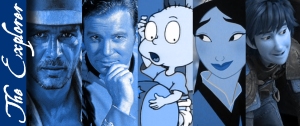



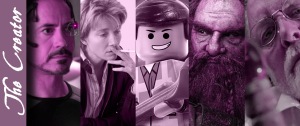

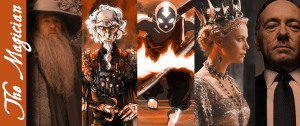
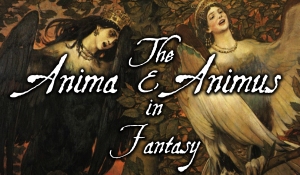







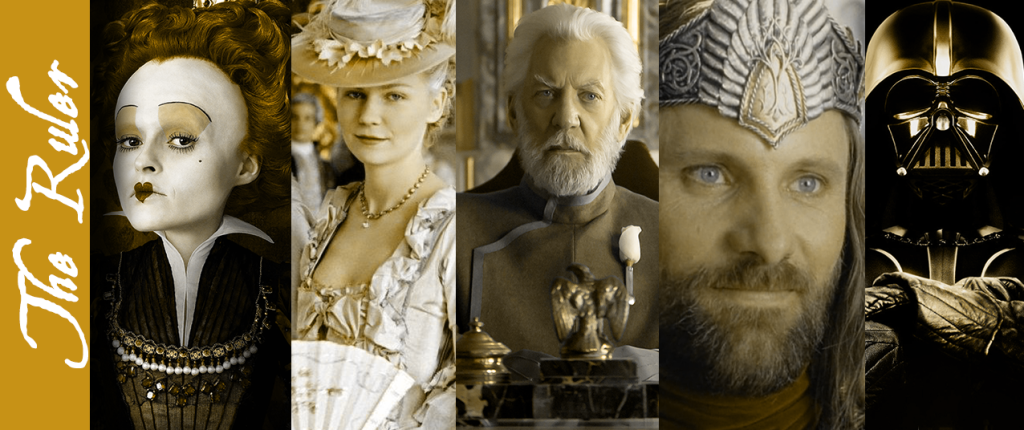






















14 responses to “Archetypes: Ruler”
*applauds Ariel* Fantastic job with this series! This is an excellent (and oddly appropriate) archetype to end with, too. You made an interesting point about how benevolent Rulers could fall into their shadow self and become their evil equivalent – because with power, that can so easily happen. Imagine Aragorn being more like Sauron… *shudders*
LikeLiked by 1 person
Definitely. It’s easier for the shadow to come, but also, it’s just what the story dictates. You can’t have a pure ruler unless that ruler is going to be killed (Mufasa) or unseated, or (as in children’s movies) not actually powerful. And thanks for being so patient with the wait! I’m hoping to do the next chapter of this series over the course of 2017. 🙂
LikeLiked by 1 person
Excellent. For me, it has to be King Arthur (and the excellent ‘Excalibur’) or Darth Vader. In any case, King Arthur is a far more interesting character than Aragorn ever was… in fact, I would love to read of Aragorn’s descent into flame and darkness.
LikeLiked by 1 person
Always happy to find another Excalibur fan! Well, I know a couple of my readers who adore Aragorn’s purity as a ruler, but I think that’s what makes them “boring,” right? Of all the archetypes, the Ruler is definitely the one that has to exist in shadow to exist in a story, though I’m certain we’d all be happy with pure rulers in the real world… haha.
LikeLike
Glad to see your archetype series is back!!
LikeLiked by 1 person
Yeah…. I’m really happy to have been finally able to get to the end of this particular portion of it. Next up will be series more related to the development of the archetypes for fiction (since they obviously weren’t originally meant for fiction.)
LikeLike
I’ve been trying to watch the Hollow Crown series of Shakespeare’s plays. I don’t think any English kings are the guys you want to have tea with.
LikeLiked by 1 person
Such a cool idea for a post!
LikeLiked by 1 person
Thank you so much!
LikeLiked by 1 person
You’re welcome!
LikeLike
I loved studying the archetypes as part of my counseling degree. They’re fascinating and it’s interesting how embedded they are in our psyches. Wonderful fodder for the writer and for character building. Great post!!
LikeLike
If a novelist understands about archetypes and wishes to write a novel that’s more soul-touching, then they might consider crafting their stories with those broader character metaphors in mind. Certainly in literary criticism in undergraduate lit. courses it is touched upon.
LikeLike
Nice article. It now makes sense why, as a Ruler, I chose a course in King Arthur. However, you might consider correcting the usage of ‘way’ to ‘weigh’ in the second paragraph. Sorry about being the spelling police…just trying to create a better, more ordered place as is my ‘way.’ 🙂
LikeLike
Many thanks for the correction! I’ll never complain. 🙂 I’m glad you like the post.
LikeLike